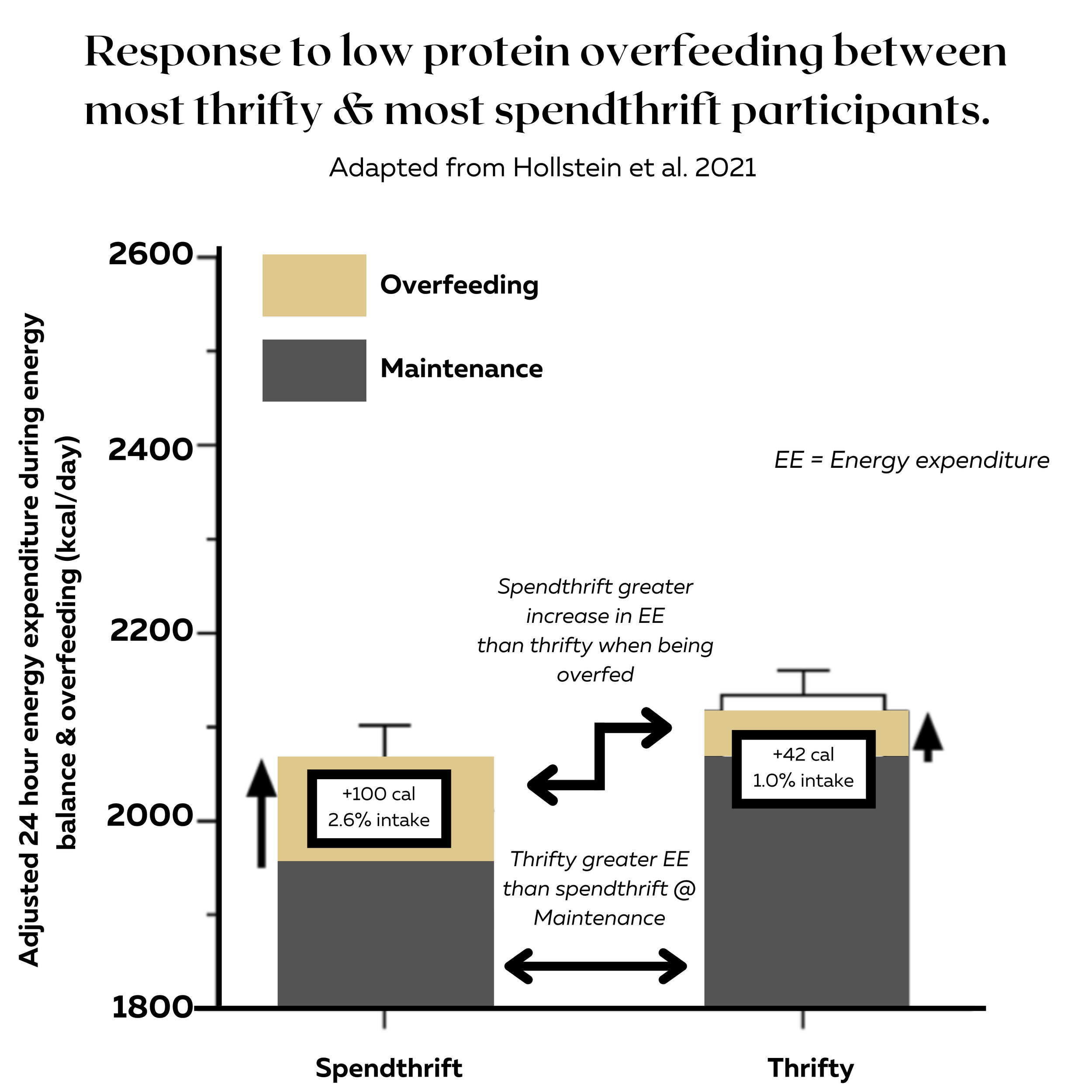Why Weight Loss is More Challenging For Some Than For Others
In an unfair world, why would the human metabolism be any different?
By: Dylan Dacosta
7 min read
Spark Notes
Weight loss and in particular fat loss will be governed by energy balance. If you consume less energy than you burn, you will lose body mass via using stored body fat or lean body mass. Vice versa for consuming more than you burn.
With that being said, your maintenance calories are not as static as you may think. Some folks experience larger reductions in energy expenditure when eating less, while some experience only small to negligible reductions.
This will mean some people have a greater defence against fat loss, while some people have a smaller defence against it
This does not make a fat loss attempt impossible, but understanding this can help us have a more compassionate approach to understanding the unique struggles any individual may face when aiming to lose weight.
Let’s talk about an interesting topic that I think can bring some helpful insight into an often frustrating situation:
The unique and individual challenges of weight loss.
Changes in body weight ultimately will come down to calories in versus calories out. Anyone who denies this is actually denying a law of physics.
But with that out of the way, the principle of energy balance is quite complicated within the human body.
While the equation may seem as simple as energy in versus energy out, the actual components that make up both energy in and energy out are complex and will vary from individual to individual.
This brings up a scenario we may all be familiar with. Perhaps you know somebody or are that somebody who really seems to struggle with weight loss or even weight gain.
Someone who may eat less and see no changes in body weight or eat more and also see no changes in body weight.
In the research, the idea of being a “thrifty” or “spendthrift” phenotype has been seen explored and observed in several studies.
The idea is that someone with a thrifty phenotype will actually have larger reductions in energy expenditure when they eat less and will have smaller increases in energy expenditure when they eat more. This outcome would make weight loss harder, while making weight gain easier.
While the spendthrift phenotype would actually have smaller energy reductions when eating less and larger energy increases when eating more. This would make weight loss easier, while making weight gain harder.
With this being said, these two terms are not completely dichotomous - they exist more on a spectrum (i.e. more or less thrifty/spendthrift). They also do not completely explain why some folks struggle with their weight more than others.
Rather, they are worth understanding since they can explain these struggles partially. I think this can be useful because it is the case that weight loss will be easier for some than others from a purely physiological level. This doesn’t mean anything is wrong with you, but this is a practical reality than some folks will face.
The graph above from this paper demonstrated the larger increase in energy expenditure in the spendthrift individuals than the thrifty individuals when fed a diet that was double their calorie maintenance. It’s also worth noting, the increases weren’t massive, but they were present. Also, in this paper, the thrifty individuals had slightly higher energy expenditure while at maintenance. So it’s not as if being more thrifty means you’re destined to being larger.
Using this example, the more thrifty folks would simply store more of the excess calories above maintenance as body fat. While the more spendthrift folks would store less since their energy expenditure would increase a little more while eating above their maintenance.
Another paper did show a moderate correlation between those who had lower drops in energy expenditure when fasting with having higher increases in energy expenditure when being overfed. This would be the quintessential spendthrift individual.
You could sum this person up as having less of a defense against weight loss and more of a defense against weight gain.
*For some extra nerd stuff, the “r” value mentioned above just represents the correlation between two variables. A 0.55 r value would be a moderate correlation meaning there is a pretty decent relationship between the two variables, but they don’t entirely explain each other.*
Lastly, I’ll refresh you of a study I covered a while ago on sets of twins who ate 1000 calories above their maintenance for 84 days. The average weight gain was 17.9 lbs of body fat, but the variance was quite interesting. The smallest amount of fat gained was 9.5 lbs and the most was 29.3 lbs.
A near 20 pound difference in fat gain even though they were put on the same caloric surplus from baseline for the same amount of time. It’s also worth nothing all the subjects were housed, fed and monitored during the entire trial.
In this example, the person who gained the least amount of fat only stored about 40% of their excess calories (and seemingly burned off the extra) while the largest gained was unfortunately hyper efficient with those calories and stored essentially all of them.
These would be prime examples of the spendthrift and thrifty individuals. It’s important to know that these two individuals had no control over these responses too. They were housed, fed, monitored and had their activity controlled for during this study.
What Can You Take Away From This?
Firstly, there is an individual response to dieting. Whether that is while being overfed, or intentionally eating less calories.
This is why the diet that you can adhere to and sustain while moving toward your goals is going to be the best one for you personally.
Also, if you’re succeeding on a diet, while your friend is not, this does not mean you’re working harder. It might, but it also might mean your body may defend against fat loss less than them.
Vice versa, just because you’re struggling on a diet, but a friend is succeeding, does not mean you’re “broken”.
You may just face more physiological obstacles than them when it comes to achieving weight loss.
Both parties can still achieve weight loss, but we do need to recognize the individual obstacles we all face. This way we can be more supportive and encouraging instead of being more judgmental and less empathetic.
Now, if you suspect you’re someone who defends against weight loss to a greater degree, then here are some basic things you may want to keep in mind if you’re intentionally aiming to lose body fat.
You may need to get into a larger deficit than you’d expect. If you maintain on say, 2400 calories, then the standard 500 calorie deficit per day on average, will likely be less than 1900. If your energy expenditure dropped by 200 calories due to eating less and from your body defending fat loss to a greater degree , then 1900 calories would actually only be a 300 calorie deficit in that situation. In this case, a 500 calorie deficit per day would actually be 1700 calories per day.
It’s worth noting that eating at 1900 would still be a calorie deficit and would likely be more sustainable, but if you were following that and expecting a faster rate of weight loss, you’d likely be left very frustrated and perhaps more likely to throw in the towel. So understanding this can be helpful in shaping reasonable expectations.
Alternatively, you may want to put a higher degree of focus on keeping overall activity high when intentionally dieting. Since one way the body can defend weight loss is through reducing non-resting energy expenditure, aiming to keep your activity levels high by maintaining your workout regimen and perhaps even having a daily step goal is generally useful weight loss advice, but may be even more helpful to those that defend weight loss to a greater degree.
Lastly, keeping protein intake and fibre intake as a priority is also something I strongly recommend here too. Since they tend to be more thermic (meaning costs energy to consume) and also more filling in a lot of cases, this advice may make a small dent on the energy expenditure front, but also help manage the energy intake a little more easily. Nothing here is revolutionary, but any benefit, even if trivial, is worth focusing on if it’s manageable!
Final note, this doesn’t even touch on the psychological and environmental obstacles any individual may face, so it’s key to remember that being more thrifty or more spendthrift are simply just one potential piece of a large puzzle when understanding the obstacles any individuals may have with weight loss.
Cheers,
Coach Dylan🍻
References:
1.Reduced adaptive thermogenesis during acute protein-imbalanced overfeeding is a metabolic hallmark of the human thrifty phenotype
https://pubmed.ncbi.nlm.nih.gov/34225360/
2. Energy Expenditure Responses to Fasting and Overfeeding Identify Phenotypes Associated With Weight Change
https://pubmed.ncbi.nlm.nih.gov/26185280/
3. The Response to Long-Term Overfeeding in Identical Twins
https://www.nejm.org/doi/10.1056/NEJM199005243222101?url_ver=Z39.88-2003&rfr_id=ori:rid:crossref.org&rfr_dat=cr_pub%20%200www.ncbi.nlm.nih.gov
4. Adaptive Thermogenesis In Humans
https://www.ncbi.nlm.nih.gov/pmc/articles/PMC3673773/






